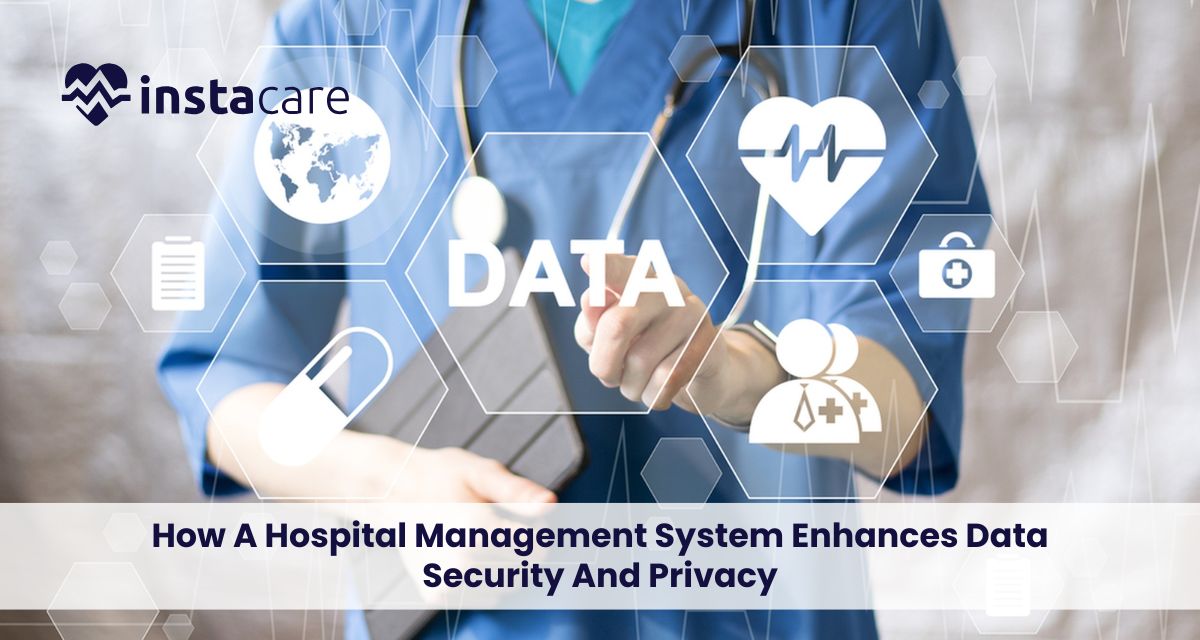Last updated on Monday, 4, November, 2024
Nowadays effective and efficient record keeping and protective medical records become the top hospital priorities associated with IT advances. A Hospital Management System (HMS) has a very important role to ensure the security and privacy of data in health care organisations. In terms of storing of patient data, it is clear that HMS is a solid means of obtaining solutions to deal with the medical information securely. In this case, this work explores how an HMS can enhance its ability to protect data and also meet regulation requirements.
Table of Contents
Centralised Data Management
Many of the Hospital Management System benefits include the issue of integrated data storage where the system will contain records of the patients, their medical history, treatment plans, and charging. It also lets the authorized staff get the needed data quickly with the help of a single core system instead of numerous databases which can be easily hacked. Centralization also minimises the number of interface points for any unauthorised intervention hence enhancing security by using only one secure interface for the entire organisation.
Role-Based Access Control (Rbac)
An HMS generally adopts the Role-Based Access Control (RBAC) to ascertain that only permitted individuals can get access to the relevant information. RBAC provides differential access to data according to the organisational positions of employees including doctors, nurses, administrators together with lab technicians. For example, whereas medical practitioners can view a patient’s medical history information, the clerical staff can only view the payment information. RBAC makes the system more secure, reduces the probability of people accessing information that they are not supposed to access, more especially patient’s information.
Encryption Of Information And Confidential Comms
Since patient information may be at risk of being compromised, an HMS must typically use data encryption techniques that protect at-rest and in-transit data. Moreover, clear communication within the HMS like the encrypted messaging to enable medical service providers to share information with each other without interception by criminals.
Audit Trails And Activity Monitoring
An HMS improves the protection of the data by storing intricate records that show who altered the data and when. These trials can include patient record access details, for example a name of the user, date and time of the actions, and possibly changes to the data. Maintaining such audit logs helps the hospital administrators recognize any specific or unlawful activity hence prompt action to any threats of breaches. This monitoring of activity ensures that staff is held to account and that there is reduction of the negative impact of internal data misuse.
Increased Physical Security Measures
Hospital Management Systems at the advanced level use MFA to ensure that those who are using the system are indeed authorized to do so. MFA entails users to give several proofs of their identity, such as a password, fingerprint, or one time token code sent to the user’s devices. This layer of security ensures that only the right people get into the system hence protecting patient information as well as increasing privacy. Some of the HMS solutions also incorporate the authentication technique such as facial recognition or iris scanning which enhances the security since only permitted persons can access the information.
De-Identification Of Data For Research Use
An HMS can scrub patient information by removing identifying information that may interpose privacy to enable its use in research and analysis. De-identification eliminates details like the patient’s address and phone numbers leaving little chance of linking the information back to specific patients. Meaningful conclusions can be provided after analyzing the policies of different healthcare facilities to researchers and without compromising the privacy of patients’ information. This practice also has benefits of premature compliance with the privacy rules such as the HIPAA that require that patient data used in research should be sealed.
Legal And Regulatory Compliance
A strong HMS assists the health care organization to meet data protection regulations and policies, for instance, HIPAA of the United States or GDPR of Europe. They consist of substantial provisions that concern the manner in which patient information is processed, managed, and disseminated. An HMS usually has compliance features already included as data encryption, access control, and compliance audits so that healthcare providers meet said laws. Apart from ensuring privacy to patients this regulation helps the healthcare facilities eliminate the risk and potential to incur fines and be legally held responsible.
Automated Data Backup And Recovery
Medical facilities can hardly afford permanent data loss resulting from system crashes, hackers, or natural disasters. An HMS provides two features that enable it to automatically back up patient data and allow for its recovery in case of system failure. This process reduces the time that healthcare facilities take off their systems and maintain a safe distance from patients’ information while at the same time avoiding loss of important data. Automated backups form a crucial part of the protective system since it provides an easy way for the healthcare facilities to regain functions in case of disruption.
Improved Data Transmission To Authorised Entities
A current problem in a healthcare delivery system is the exchange of patient’s information among multiple health care providers like the specialists, the laboratories, and the pharmacies. An HMS eases such a transfer by enabling data to be shared within the hospital’s internal network directly and with permitted external providers through interfaces such as the Application Programming Interfaces (APIs). These APIs enable different systems to work as a single entity in an intelligently integrated system while data privacy is not affected. Due to the successful safeguarding of the patient data the information sharing with an HMS allows for efficient health care management.
Cyber Security
There has been a growth of cyber attackers in the healthy sectors, this means that hospitals must ensure that they guard their systems. An HMS is equipped with security features that help in identifying and protecting an enterprise from probable cyber risks including malware attacks, phishing and ransomware. Several recurring HMS aspects function to protect the system from intruders and they include firewalls, intrusion detection systems and antivirus.
Automated Software Patches Updates And Operating System Security Patches
An HMS vendor usually brings software improvements of the HMS, as well as solutions to known vulnerabilities, on a periodic basis. All these updates are critical in keeping the system safe, especially because users leave the system open with older software that has vulnerabilities via which an attacker can get in. Using a structured update schedule is a good way to make sure that one’s HMS is protected by all of the latest security patches, and therefore, less likely to be breached. This approach to maintaining the system also supports data security hence counterchecking on the protection of the patient information.
Better Patient Loyalty And Organizational Image
Safeguarding data from leakage and its security plus privacy is not only a compliance issue but also an issue of trust. Patients are more comfortable in discussing issues with their HCPs that will involve sensitive data that are well protected. With the use of secure HMS, hospitals indicate to their patients that they respect the patient’s privacy and this makes the patient trust the hospital. This trust can also translate into improved patient outcomes, because patient’s have no reason to hold back information that might be vital in diagnosis or treatment.
Conclusion
Hospital Management System is needed in order to maintain the highest level of security and confidentiality within the large healthcare organisations. An HMS handles a number of the difficulties that hospitals encounter in trying to adequately recuperate patient information security through the following: Centralization of patient data, role-based access control, data encryption, audit trails, and sophisticated authentication methods. By these security measures, health care providers can be able to discharge their duties or responsibilities on health care delivery without any interference from security_issues which might in the long run lead to a compromise of patients ‘trust and privacy.
FAQs
How does a Hospital Management System protect patient data?
A Clinic The executives Framework protects patient information with encryption, job based admittance, and review trails, guaranteeing just approved workforce can get to delicate data.
What are the main security features of an HMS?
A HMS incorporates information encryption, multifaceted validation, and movement observing to safeguard patient security and forestall unapproved admittance to delicate records.
How does an HMS enhance compliance with healthcare regulations?
A HMS assists medical care offices with satisfying legitimate guidelines like HIPAA and GDPR by upholding secure information rehearses and keeping up with consistency with protection and security guidelines.



